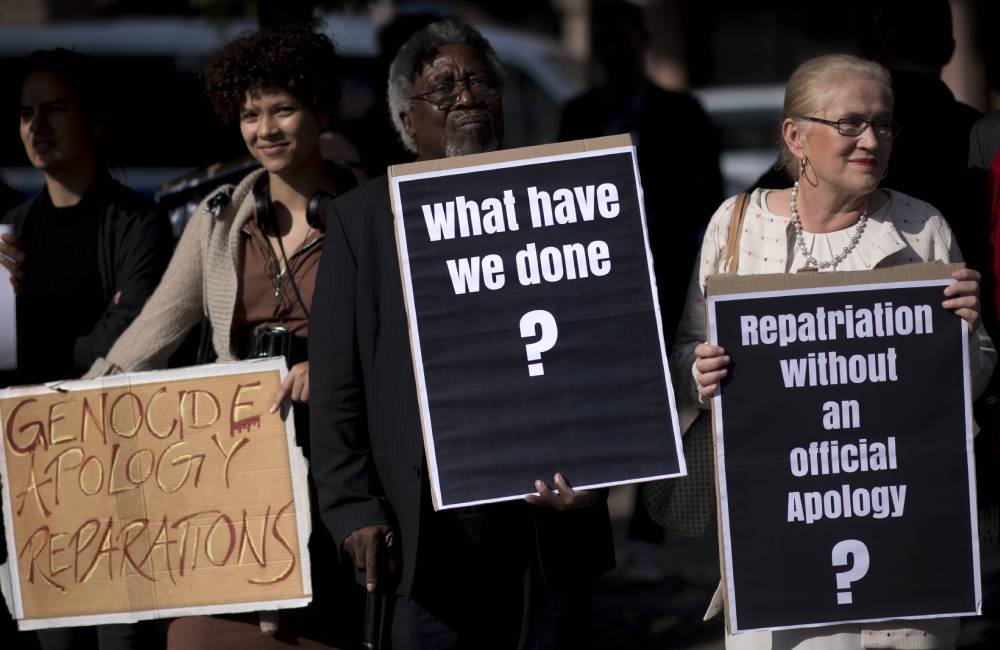Today, Germany is not well known as a colonial power. But from 1904 to 1908, German troops in Deutsch-Südwestafrika, which is today Namibia, attempted to wipe out two native peoples. There is not much room for debate. The German commander at the time, General Lothar von Trotha, issued a Vernichtungsbefehl, an order to exterminate the Herero. He wrote:
“Any Herero found inside the German frontier, with or without a gun or cattle, will be executed. I shall spare neither women nor children. I shall give the order to drive them away and fire on them.”
The German troops took this order seriously. Tens of thousands of people were shot, hanged, or driven into the desert to die of thirst. Survivors were worked to death in concentration camps. Within a few years, 80 percent of the Herero people and 50 percent of the Nama people were killed.
Last week, media around the world announced that Germany, 116 years later, would finally recognise this genocide. After more than five years of negotiations, a deal was reached between the German and Namibian governments that will include an apology by the German president and €1.1 billion in development aid. German Foreign Minister Heiko Maas was quoted as saying: “We will now officially refer to these events as what they are from today’s perspective: genocide.”
Many will think: finally! It has been five years since the Bundestag officially recognised the genocide against the Armenians in 1915, committed by the Ottoman Empire, which was Germany’s ally in World War I.
But Germany is a country run by lawyers — about a fifth of the members of the Bundestag have law degrees — so it’s always important to study the fine print. Maas says explicitly that Germany is not recognising the genocide in Namibia according to the UN Convention on Genocide from 1948 or in any legal sense. German lawyers are claiming that the convention cannot be applied retroactively. To translate that from legalese, they are saying: how could German troops back then have known that exterminating a whole people was wrong?
Genocide “in a moral sense” or “in a legal sense” might sound like a distinction without a difference. But this has been the German government’s main priority in all the years of negotiations. An actual acknowledgement of genocide would give the descendants of the victims possibilities to seek reparations. But in Maas’s words, Germany is only offering a “gesture” and no reparations.
€1.1 billion might sound like a lot. But that sum is to be spread over 30 years, and is more or less in line with what Germany has been paying in development aid since Namibia’s independence 30 years ago.
Representatives of the Herero and Nama peoples are rejecting the deal. Laidlaw Peringanda, a Herero activist, told the BBC: “We’re actually not accepting that offer because our people have lost lands, they have lost their culture.”
In a joint press release, the official representatives of the Herero and Nama peoples denounced the agreement as a “public relations coup by Germany.” The descendants of the victims were excluded from the negotiations. The Namibian government, which was sitting at the table, is dominated by other ethnic groups.
There are many reasons why Germany wants to avoid reparations. The genocide in Namibia was not an isolated case. Massacres took place across Germany’s colonial empire, from Deutsch-Ostafrika to the Deutsch-Südsee to China, and numerous cases of mass murder could be classified as genocide. This could be a pandora’s box.
The colonial powers plundered unimaginable wealth from Africa and the rest of the world — what would happen if they were supposed to pay even a tiny share back? This is not just about Germany, either. France, Britain and Portugal, with their incomparably longer colonial histories, have been responsible for even worse violence.
Colonialism is not an ancient chapter of world history that can be closed with an apology and a cheque. The legacy of colonialism shapes the modern capitalist economy. Germany lost control of South-West Africa after World War I, but the territory was later ruled by the Apartheid regime in South Africa. West Germany supported that racist regime for decades. (East Germany, in contrast, gave aid to the South West Africa People’s Organisation in the fight against Apartheid.)
Namibia became independent in 1990, but as this documentary from Redfish shows, Apartheid Continued. There is now legal equality between white and Black people. But the tiny German-speaking minority, the descendants of settlers, still control the country’s wealth — by some estimates less than one percent of the population owns 70 percent of the land.
German colonialism is still alive in many forms. Right now, the Bundeswehr is on neocolonial missions across Africa, still protecting German plunder with military might.
Maas’s talk of reconciliation might sound nice. But who is being reconciled with whom, and on what basis? Isn’t the German government asking the descendants of the victims of genocide to reconcile themselves with the fact that their suffering will continue?
Serious financial contributions could be a first step to alleviating the ongoing plight of the Herero and Nama peoples. But real justice means dismantling the imperialist structures that were created by 500 years of violence and genocide. It means taking the vast wealth hoarded by the capitalists of the developed world, and distributing it to the people who created such wealth over the centuries.
And while we’re talking about “gestures of reconciliation,” I feel like this would be a good moment to mention that the Columbiadamm Cemetery in Neukölln contains a gigantic rock that honours seven German soldiers who lost their lives while committing genocide. At the same time, there is not a single memorial for the victims anywhere in Germany, except for a crappy plaque placed below the pro-genocidal “Africa Stone.” It’s hard to imagine why Berlin authorities didn’t remove the rock decades ago.
Originally published on June 9, 2021 in Exberliner.











